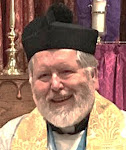For a long time I have read thought-provoking articles by Frederica Mathewes-Green. They have appeared in such diverse publications as the Washington Post, Christianity Today, Smithsonian, the Los Angeles Times, First Things, Books & Culture, Sojourners, Touchstone, the Wall Street Journal, the Religion News Service, Beliefnet.com, and her podcast “Frederica Here and Now” is carried on Ancient Faith Radio. She has published nine books, and is a well known speaker on university campuses throughout the USA, and lives with her husband, the Rev. Gregory
Mathewes-Green, in Baltimore, MD, where he is pastor and she is “Khouria”
(“Mother”) of the parish they founded, Holy Cross Orthodox Church.
Frederica's website HERE
is agreat archive of her writings on a whole range of subjects. I encourage
you to explore it.
The following piece (and the photos) are from her Facebook page today:
Last night was the beginning of Lent for
Eastern Orthodox Christians. We are far behind the West this year. The reason
is that the date of Pascha / Easter depends on the date of the vernal equinox
(first day of Spring) and also the phases of the moon, and some years we have
the same Easter, and some years (like this year) we are as much as 5 weeks off.
On the Sunday evening that Lent begins, we
have a vespers service. Afterward we have the Rite of Forgiveness. The members
of the congregation line up, face to face, and ask for each other's
forgiveness, and give it. I found a few photos from around the web to show what
this might look like.
How it works is, the congregation forms two
lines, face to face. Each person is paired with another member of the church,
standing face to face with them. Either one of you begins by making the sign of
the Cross and bowing, honoring the presence of God in the other person. You say
something like, "Please forgive me for any way I have sinned against
you." Put it in your own words. Even if you can't think of any specific thing
you did against this person, the daily tide of sins we commit makes make this
world a more sick and miserable environment.
Orthodox think of sin, not as individual
culpable deeds, but as a destructive, undermining condition which we all
contribute to, and which we all suffer from. Sin is not necessarily
pleasurable; our feelings of fear and despair participate in this miasma of
sin. A good analogy is air pollution. So even if I haven't done anything
against this specific person deliberately, I have by my sins made this a more
miserable world that she has to live in.
The person then says "I forgive you, and
please also forgive me for my sins," putting it in her own words. You
respond "I forgive you," and then you embrace.
Then both of you take a step to the right,
and face a new person, and go through that exchange again. Since it involves
everyone, people within families exchange forgiveness too--brothers with
sisters, parents with teenagers. At Holy Cross most of the congregation comes
to Forgiveness Vespers, about a hundred people. The Rite of Forgiveness takes
about an hour for us.
I've never been able to learn anything about
how and when this Rite originated. As a new convert I thought it sounded
touchy-feely, but it is apparently very ancient; the last acts of the Emperor
of Constantinople and his court, as the city fell in 1453, were to ask
forgiveness of everyone they could find, including servants. The Rite is also
mentioned in the story of St Mary of Egypt, which occurred in the Holy Land perhaps
around AD 520, and was written down a hundred years later. So it's been the
practice for a very long time, and I'd love to know more of how it came to be.
Even if you're not Orthodox you can ask forgiveness of the people around you. It's a ready exercise in humility, which we all need more of.





















0 comments:
Post a Comment